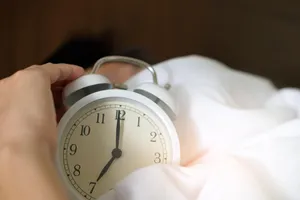Is it possible to live permanently with 4–5 hours of sleep? – The science behind short sleepers
Theresa Hauser, MSc. | 07.11.2025

Anyone who regularly sleeps only four to five hours a night knows the phenomenon: While many feel exhausted during the day, some people claim they have been "getting along just fine with little sleep for years." But is that really true – or is one's perception deceiving? In this article, we examine what research knows about so-called short sleepers, what genetic and biological factors are behind it – and why consistently getting too little sleep is problematic in the long term.
How much sleep does a person really need?
The optimal sleep duration varies individually. However, large meta-analyses show a fairly stable window:
For adults, 7–9 hours of sleep per night is considered beneficial to health.
Below six hours, the risk increases for:
- cognitive performance deficits,
- cardiovascular diseases,
- diabetes, overweight, and
- mood disorders
- shortened life expectancy.
These effects are well documented. Nevertheless, there are people who get by with less sleep – at least subjectively.
What are "short sleepers"?
Scientifically, people are referred to as "short sleepers" when they consistently sleep less than six hours per night and still feel capable. Two groups are distinguished here:
- Compensated short sleepers
They sleep too little, live with chronic sleep deficit, and function in everyday life only thanks to increased stress hormones, coffee, and adrenaline. In the long term, significant health disadvantages become apparent here.
- Natural short sleepers
An extremely rare genetic variant. Less than 1% of the population carries mutations (e.g., in the DEC2 gene or the ADRB1 gene) that alter the internal clock and sleep homeostasis. These people actually need less sleep – and show neither performance nor health deficits.
Test sleep² now and learn to sleep better!
To the sleep² appThe Genetics of Short Sleepers
In 2009, researcher Ying-Hui Fu at the University of California discovered that carriers of the DEC2 mutation naturally require about 1.5 hours less sleep. Later studies identified additional variants that influence wakefulness systems in the brain.
These genetic short sleepers are not trainable – only those who carry the mutation can train themselves to "sleep less." The body compensates for the lack of sleep through microsleep episodes, reduced attention, or later catch-up sleep.
Why little sleep feels manageable in the short term
Many people underestimate the consequences of sleep deprivation because self-assessment is very deceptive. Studies show: After just one week with < 6 hours of sleep, participants believe they have "gotten used to it" – objectively, however, reaction time, attention, and memory performance continue to decline.
The brain doesn't really adapt – it just notices less that it is tired.
But be careful, even <7 hours can already be too little for many people and lead to similar performance impairments. As soon as you "catch up" on sleep on a day off and sleep longer than during the workweek, it can be assumed that you are suffering from chronic sleep deprivation. You can find your personal optimal sleep window most easily during vacation when you can sleep in for several days in a row. You should then aim for this sleep duration consistently and not just on weekends.
Health consequences of chronic sleep deprivation
In the long term, regular short sleep leads to a variety of physiological changes:
- increased blood pressure, inflammation levels, and cortisol levels,
- impaired glucose tolerance,
- weight gain due to hormonal imbalances (Leptin/Ghrelin),
- weakened immune function.
The risk of depression, burnout, and dementia also increases. Long-term data clearly indicate: Consistently less than six hours of sleep is considered a health risk.
What helps if you regularly sleep too little
For many, less sleep is not a conscious lifestyle choice, but a result of stress, family, or shift work. Moreover, many people simply do not prioritize sleep enough and prefer, for example, a good late-night movie with their partner on the couch over a bit more rest in the bedroom. The following measures help improve sleep and give it more space:
- As similar sleep and wake times as possible, even on weekends
- Light management: bright daylight in the morning, dimmed light in the evening
- No caffeine intake from late afternoon onwards
- Reduction of screen light in the last hour before sleep
- Relaxation routines (breathing exercises, reading, calming audio plays, music, etc.) especially shortly before bedtime
- Sleep tracking (e.g., with sleep²) to raise awareness of individual patterns
Conclusion
True "short sleepers" are extremely rare. For most people, consistently less than six hours of sleep is a gradual burden on the body and mind – even if they feel subjectively well. Those who are frequently tired, have concentration problems, or feel they are never truly rested should seriously review their sleep behavior.
Sleep is not lost time – it is the prerequisite for performance, health, and quality of life.





